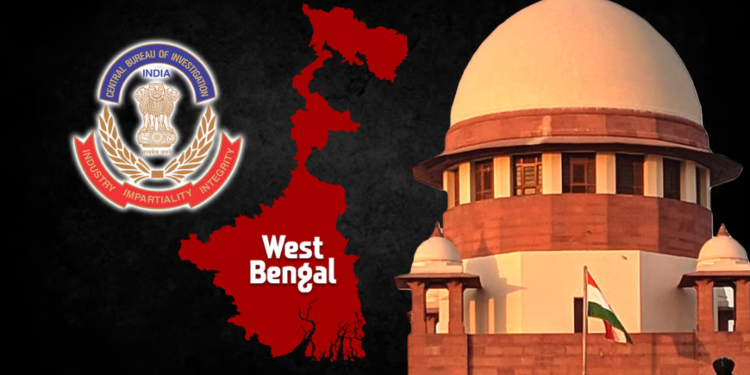On Wednesday, the Supreme Court upheld the maintainability of the West Bengal government’s suit alleging misuse of the Central Bureau of Investigation (CBI) by the Central government [State of West Bengal v. Union of India].
A Bench of Justices BR Gavai and Sandeep Mehta stated that the State’s complaint disclosed a cause of action, dismissing the Union government’s claim of material suppression of facts.
“The contention of the Union is rejected. The suit by West Bengal shall proceed in accordance with law. We observe that these findings will have no bearing when the suit is decided on its own merits,” the Court declared.
The Court further noted that it could not be said that the West Bengal government had not made a case against the defendants, including the Central government and the CBI. It added that West Bengal’s suit raised a legal issue regarding whether the CBI could register and investigate cases in violation of Section 6 of the Delhi Special Police Establishment (DSPE) Act after the State revoked general consent.
The suit will be heard on August 13 for the framing of issues.
The original suit, filed by the Trinamool Congress (TMC)-led West Bengal government, alleges that the CBI is being misused to target State governments. The TMC government argued that since the State had withdrawn general consent for the CBI to investigate cases in the State, the central agency could no longer proceed with investigations in West Bengal.
The West Bengal government also argued that allowing the CBI to enter a State for investigation generally leads to the Enforcement Directorate (ED) following suit, which has significant implications for Indian polity.
The Central government countered that the West Bengal government could not sue the Centre over cases being probed by the CBI, as the central agency was independent. The Centre asserted that the suit by the West Bengal government was not maintainable since no cause of action was disclosed in the complaint against the Central government. The Centre also argued that the CBI could not be made a party to such suits as per Article 131 of the Constitution, which pertains to the original jurisdiction of the Supreme Court in Centre-State disputes.
Senior Advocate Kapil Sibal represented the West Bengal government, while Solicitor General (SG) Tushar Mehta represented the Union government. The Court had reserved its verdict on the maintainability of the suit in May this year.
The case originated from the results of the State Legislative Assembly elections held in West Bengal in May 2021. Following the elections, many individuals who had fled their homes due to violence approached the Calcutta High Court, claiming they were being prevented from returning home by workers of the ruling TMC.
On May 31, the Calcutta High Court ordered the formation of a three-member committee to ensure that persons displaced by post-poll violence in the State could return to their homes. The High Court then called for intervention by the National Human Rights Commission (NHRC). Subsequently, the then NHRC Chairperson, Justice Arun Mishra, constituted a seven-member committee to inquire into complaints regarding post-poll violence.
The committee’s report accused the TMC of enforcing the “law of the ruler” instead of the “rule of law” and called for a CBI probe into the matter. The State government strongly contested the NHRC report, questioning the impartiality of the human rights body. It proceeded to file an original suit against the Central government, also questioning the High Court’s decision to order a CBI probe.

















